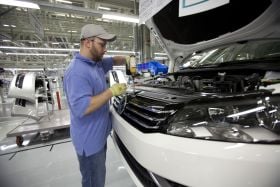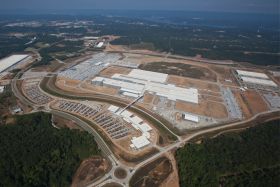VW Positioning to be Top Auto Manufacturer in the World
Opening manufacturing plants in the U.S. is nothing new to the international automotive market—Asian manufacturers like Toyota, Nissan, Hyundai and Honda have been manufacturing in the U.S. for decades. But European automotive manufacturers have been more hesitant to manufacture in America…until now.

Ramping Up U.S. Manufacturing for VW
Opening manufacturing plants in the U.S. is nothing new to the international automotive market—Asian manufacturers like Toyota, Nissan, Hyundai and Honda have been manufacturing in the U.S. for decades. But European automotive manufacturers have been more hesitant to manufacture in America…until now.

Assembly at Volkswagen, Chattanooga, Tenn.
In May of 2011, German-based Volkswagen held its grand opening of a massive manufacturing campus in Chattanooga, Tennessee where 150,000 Volkswagen Passats, specifically designed for the U.S. market, can be produced annually. This plant joins just one other Volkswagen facility in the Americas, the company’s plant in Mexico. According to Dr. Jan Spies, general manager of project engineering, Volkswagen AG, the decision to begin manufacturing in the U.S. was a part of Volkswagen’s aggressive new international sales strategy.
“The Volkswagen Group has committed to a strategy to increase sales worldwide to more than 10 million cars by 2018,” said Dr. Spies. “Part of this strategy is to increase sales in the U.S. to more than one million Volkswagen and Audi cars by 2018. Volkswagen decided to locate an additional production plant in
the U.S. to increase acceptance for its products as an American manufacturer that is investing in the economy and creating jobs and business in America. In addition, close contacts to the American customer base and independence from currency fluctuations played a major role in the decision.”
And it seems this move is already paying off. In July, Volkswagen announced sales in the U.S. had increased by 22 percent, which the company sees as a sign of increasing enthusiasm for its cars.
Volkswagen’s new presence in the U.S. means at least one American city is thriving despite a shaky U.S. economy. According to the Volkswagen Group of America, the company’s $1 billion investment in Chattanooga has created more than 2,000 new jobs for the Volkswagen plant alone. Some 9,500 additional jobs are expected to be created by the company’s suppliers, resulting in an estimated $12 billion in income growth. To date, $686 million local and state contracts have been awarded and an astounding $1.4 billion is predicted to be generated in total tax revenues for the state.

Aerial view of Volkswagen’s 1,400-acre campus in Chattanooga, Tenn.
Numerous Factors Make Chattanooga Optimal for VWWhat enticed Volkswagen to choose Chattanooga? According to Dr. Spies, the area possessed the most “optimal combination” of site-related factors, such as a good business climate, easy access to workforce, supply and transportation, as well as effective support from public and private sectors.
“I personally was very impressed by the flexibility and support we received from public and private representatives after the decision had been made and we started to put up the plant,” said Spies.
Volkswagen joins a long list of automotive manufacturers and suppliers that call Tennessee home. In fact, Business Facilities, a national economic development publication, has named Tennessee the No. 1 state in the nation for automotive manufacturing strength for the second year in a row. According to Tennessee Governor Bill Haslam, it is no accident so many global automotive manufacturers and suppliers are choosing Tennessee for new plant locations and expansions.
“As part of our Jobs4TN economic development plan, Tennessee has centered its recruitment efforts on six key clusters in which the state has a clear competitive advantage, with the automotive industry being one of them,” said Governor Haslam. “We are working to make sure we strike the right balance between serving Tennessee’s existing business and aggressively recruiting new companies to our state.”
“A company’s decision to expand or relocate is based on a number of factors,” Haslam continued. “Tennessee ranks 46th out of the 50 U.S. states in per capita tax burden, meaning Tennessee’s taxes are among the lowest in the U.S. We also offer competitive incentives based on a company’s capital investment and jobs created.”
- Category:
- GrayWay
Some opinions expressed in this article may be those of a contributing author and not necessarily Gray.